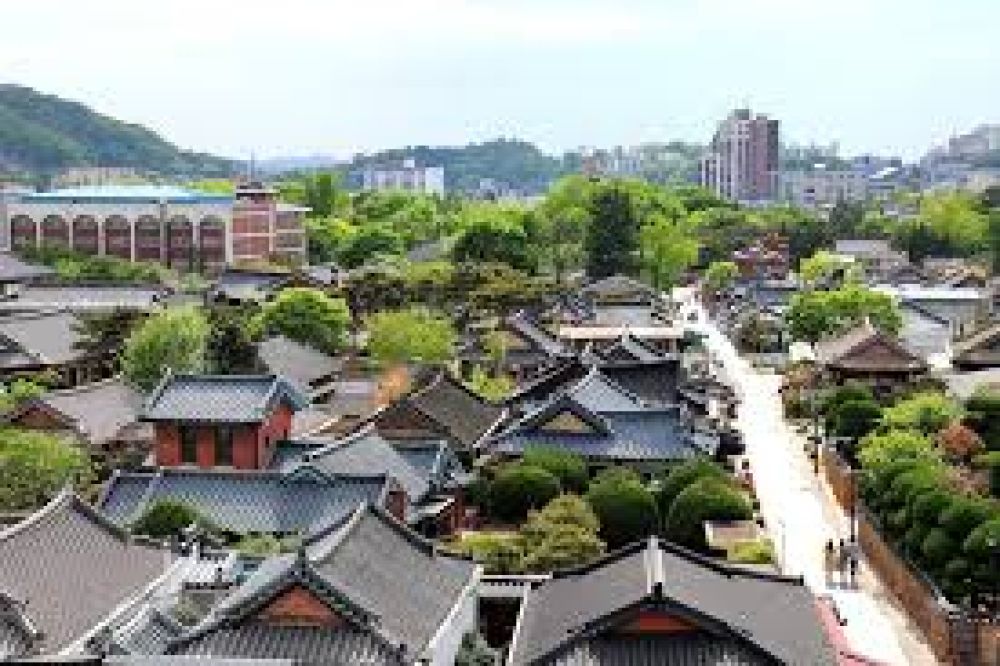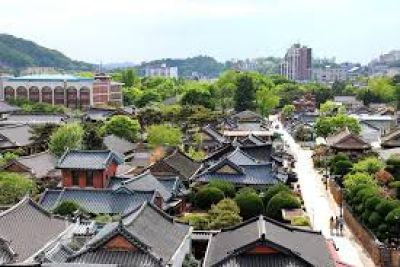

Jeonju Hanok Village is a remarkable place located in the city of Jeonju and boasts over 800 traditional Korean hanok houses. While wandering around the village, visitors can experience the authentic atmosphere of ancient Korea and appreciate the timeless beauty of the architecture. The area is steeped in history and culture with plenty of opportunities to try traditional Korean food, see artisans practicing their crafts and maybe pop into a tea house for traditional refreshments. Aside from the traditional experiences, visitors can find quaint cafes and unique shops that contrast well with the historical setting. Photographic opportunities abound against the backdrop of the hanok houses and the nearby Omokdae and Imokdae hills provide panoramic views of the village.
Jeonju is famous for bibimbap, a popular Korean dish. In this cooking class, visitors can learn how to make this dish from scratch starting with the perfectly cooked rice, to the variety of vegetables that need to be prepared, and the delicious gochujang sauce that ties it all together. Classes are typically led by experienced chefs who not only teach the cooking techniques but also provide insight into the history and importance of bibimbap in Korean cuisine. At the end of the class, participants get to enjoy the dish they mastered, making it a rewarding and delicious experience.
Located near the Hanok Village, Jeondong Catholic Cathedral is one of the oldest and most beautiful Roman Catholic cathedrals in Korea. The cathedral is known for its stunning architecture that incorporates Romanesque and Byzantine elements. Visitors to the cathedral will be able to admire the striking use of color and detail in the building's facade and interior. Touring the cathedral provides a peaceful break from the bustling city and offers insights into the Christian history of the area. Occasional cultural performances in the church compound highlight traditional Korean music and dance.
Held in July when the lotus flowers are in full bloom, the Deokjin Park Lotus Festival is an annual event that draws both locals and tourists. The park features a large pond covered with beautiful pink and white lotus flowers, and during the festival, the pond becomes a spectacular sight. Visitors can enjoy a variety of performances, exhibitions, and interactive activities that celebrate the lotus flower and its significance in Korean culture. Paddle boats are also available to get a closer look at the flowers from the water. The highlight of the festival is at night when the pond and surrounding area are illuminated, creating a magical atmosphere.
The Jeonju National Museum is focused on preserving and showcasing the traditional culture and history of the Jeolla Province. It houses a vast collection of historical relics, artifacts, and artworks from the region that provide insight into Korea's rich past. The museum's exhibitions cover a range of topics from prehistoric times to the modern era. In addition to the permanent collections, temporary exhibitions allow visitors to see a wide variety of cultural treasures and learn the stories behind them. The museum also offers educational programs and cultural experiences that engage visitors of all ages.
Jeonju is known for its Makgeolli, a traditional Korean rice wine that is creamy and slightly sweet. A tour of a local Makgeolli brewery allows visitors to learn about the history and process of making this unique beverage. The tour takes guests through the stages of production from rice selection and fermentation to the final bottling. After the tour, visitors can sample various types of Makgeolli, pairing them with traditional Korean side dishes known as 'anju'. This experience is not just about tasting; it's also a deep dive into a culturally significant aspect of Korean dining and hospitality.
Gyeonggijeon Shrine, located in Jeonju Hanok Village, was erected in 1410 and houses the portrait of King Tae-jo, the founder of the Joseon Dynasty. The shrine complex encompasses several beautifully preserved buildings and a serene garden. During the historical tour, visitors will learn about the importance of the shrine in the context of the Joseon Dynasty, and the significance of the royal portraits housed within it. In addition, the guided tour often includes fascinating tales of royal ancestry and explanations of the traditional ceremonies conducted at the shrine.
Nambu Market is a bustling traditional market established in the 1900s and is an essential part of Jeonju's daily life. Visitors can soak up the lively market atmosphere while exploring the various stalls selling everything from fresh produce and street food to clothing and handmade crafts. It's an excellent place to try local delicacies such as hotteok (sweet stuffed pancakes) and bibimbap. On Fridays and Saturdays, the market comes alive at night with the Jeonju Night Market, where vendors sell creative dishes and street performers entertain the crowds.
Jeonju is also known for Hanji, a traditional Korean paper that is renowned for its durability and versatility. Visitors can participate in a Hanji-making workshop to learn the craft of this intangible cultural heritage. The experience involves learning about the history of Hanji, its importance in Korean culture, and the process from mulberry tree bark to the finished sheet of paper. Participants get to make their own paper and often can create fans, lamps, or other crafts with the paper they've made, providing a unique and tactile memento of their time in Jeonju.
The Jeonju Zoo and Amusement Park offers a fun-filled outing for families and anyone who enjoys animal encounters and amusement rides. The zoo houses a variety of animals and provides an opportunity to learn about wildlife and conservation efforts. After exploring the zoo, visitors can enjoy the adjacent amusement park, which features rides and attractions catered to all age groups. From the Ferris wheel that offers a view of the city to the rollercoasters and merry-go-rounds, it is a place to make joyful memories with friends and family.
